Crews battle out-of-control wildfire in Metro Vancouver regional park

UPDATE — Oct. 3, 2022: Crews still fighting to control 'stubborn' fire in Metro Vancouver regional park, officials say
The regional district of Metro Vancouver, B.C. Wildfire Service and Coquitlam Fire Rescue are responding to a wildfire sparked at around 2 p.m. PT Saturday in a regional park in British Columbia's Lower Mainland, which has affected air quality in the region.
Minnekhada Regional Park, located a few kilometres east of the city of Coquitlam, has been closed since the fire broke out in the park's High Knoll area.
"The location of the fire is on extremely steep and challenging terrain, requiring both ground and air support," said Brant Arnold-Smith, the director of the Metro Vancouver's emergency operations centre.
"For the safety of crews, fire operations were limited overnight and fully resumed at first light [Sunday]," he said.
Crews are dealing with unusually hot and dry conditions for this time of year. As of Sunday morning, the fire was estimated to be burning over 11 hectares or 0.11 square kilometres.
Arnold-Smith said the cause of the fire is still under investigation but as there wasn't any lightning in the area on Saturday he says it's possible it was human caused.
The B.C. Wildfire Service said it sent 23 firefighters and three helicopters to help. There were five planes involved in bucketing efforts Sunday, including two helicopters contracted out by Metro Vancouver. Crews faced the additional challenge of there not being any nearby water sources.
Arnold-Smith says smoke from the fire will likely be lingering over eastern parts of Metro Vancouver, a federation of 21 municipalities, through Tuesday.
"Suppression activities [Sunday] are increasing the levels of smoke in the region," he said. "Over the next 24 to 48 hours we expect air quality to be affected, but it should improve as the fire is extinguished."
Wildfire season persists
Neal McLoughlin, superintendent of the B.C. Wildfire Service's predictive services said ongoing hot and dry conditions mean there is potential for ignitions across the province.
He said this year's "very unique fire season" continues.
McLoughlin said the season was unusual because it started slowly with dampness and a delayed snow melt, then transitioned into hot, dry conditions by July that continue to persist into October.
Temperatures are about five to eight degrees above normal for this time of year, and there's been little to no rain in several parts of B.C. in weeks.
"Fire season is by no means over yet," McLoughlin said in an interview.
He says between 10 and 20 millimetres of rain across B.C. over a one- or two-day period would likely be needed for the service to consider fire season over.
"Although we're not seeing as many human-caused fire starts and lightnings are tapering off, it only takes one ignition under the right conditions, and we could see a large fire or an aggressive day in terms of fire behaviour," he said.
While the wildfire service downgraded the last so-called "wildfire of note'' on Sept. 24, 174 wildfires continued to burn across the province on Sunday.
This comes as the Forests Ministry is warning about drought conditions in certain parts of B.C.
Vancouver Island, the inner south coast and the northeast corner of the province have reached the second-most severe level of drought on the five-point rating scale.


